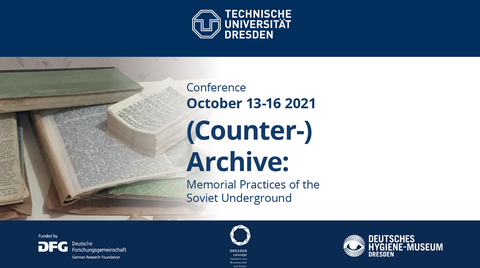(Counter-)Archive: Memorial Practices of the Soviet Underground
About the conference
Contents
Records
Contact
Welcome to our homepage of the international conference (Counter-)Archive!
About the conference
The conference "(Counter-)Archive: Memorial Practices of the Soviet Underground" is dedicated to the Soviet unofficial culture as an important agent of storage and analysis of tabooed cultural memory. The academic conference take place from Wednesday, 13th of October, until Saturday 24th of October 2021.
The complete program is also available on our website and in a compact PDF file.
Contents
The ‘archival turn’ has changed the landscape of philosophy, cultural studies and arts of the last thirty years. Poststructuralism, and most of all Michel Foucault and Jacques Derrida, updated the notion of the archive, turning it into an episteme of historical memory and also control over it. Archiving was conceptualized as one of the central memorial practices which not (only) reconstructs the narrative of the past, but produces and legitimises it. The increasing interest in the ‘management apparatus’ of collective memory in humanities and arts is symptomatic in the last decades, following the fall of authoritarian and colonial regimes and, moreover, as a reaction to the mass extermination of human life. The research focused on such topics as unequal distribution of memorial resources; conditions and practices of archiving tabooed or (temporarily) unclaimed layers of culture and history; the destruction and concealment of documents; and patterns of collective remembering that were often contingent on power and politics.
Soviet unofficial culture was not only the object of repression itself, but also a platform, or rather a whole range of platforms for the maintenance, systematisation and study of neglected or forbidden memory. This level of cultural and philological (self)reflection and its aesthetics are still little known. The practices of collecting, distributing and archiving were the result of isolation: the absence of institutions, traditionally taking on the work of organising and therefore effectuating the canonisation of cultural heritage. The fact that the delegation of the preservation, selection and analysis of artefacts and ideas was hardly possible, led to a culture of amateurish archives and private memorial practices. Vadim Zakharov, one of founders of the MANI archive, wrote about an obsession that a considerable number of underground artists had with the haphazard, unstoppable collecting of artefacts.
Finally, the topic of the archive is revealing in the light of the latest developments in humanities. The last two decades, and especially the 2010s, have marked a new turn in the documentation and canonisation of the underground heritage. The works of samizdat, tamizdat and magnitizdat are being digitalised; new anthologies, catalogues, collections of works and memoirs are published and translated into different languages (but mostly in English); competitions and awards bear the names of major representatives of unofficial literature. What do these trends mean for the future perception of Soviet unofficial culture, and can we refer to any “symptoms” of late re-actualisation and postmemory (e.g. in the heyday of non-authoritarian regimes)?
Records
All presentations were recorded and are available now under the following link:
Padlet & Feedback
For feedback, interaction and exchange we have created an anonymous padlet, which you can check out here:
https://padlet.com/klavdiasmola/ic_camposu1021
Contact
Department of Slavic Literature, Institute of Slavic Studies of Technische Universität Dresden


